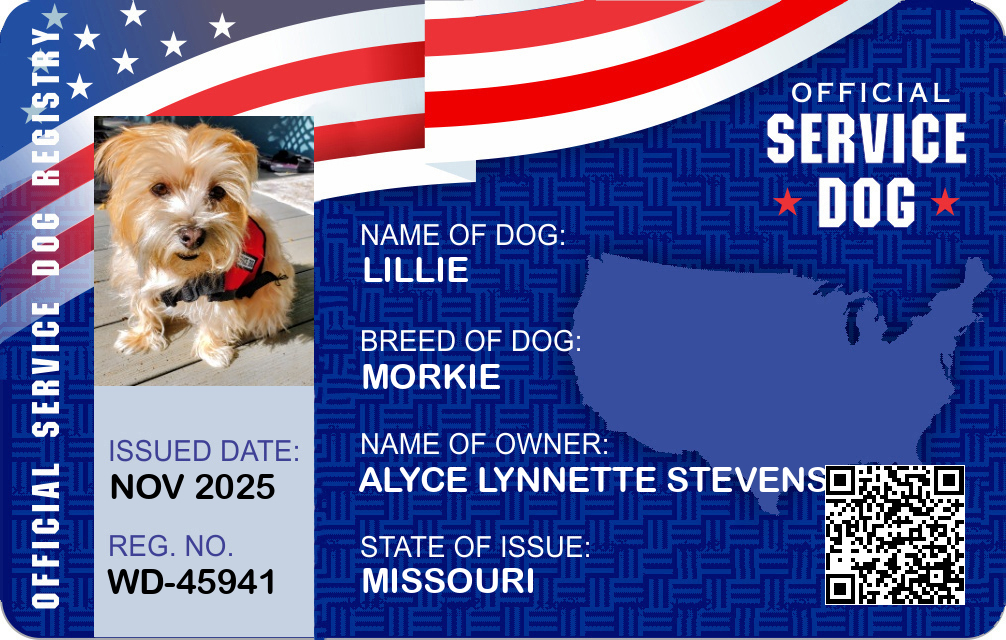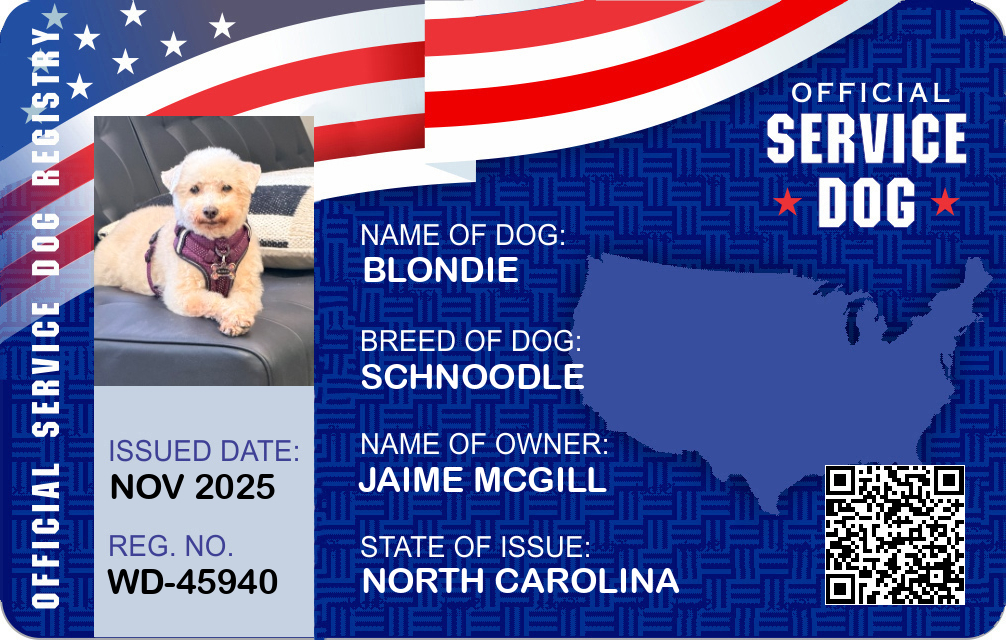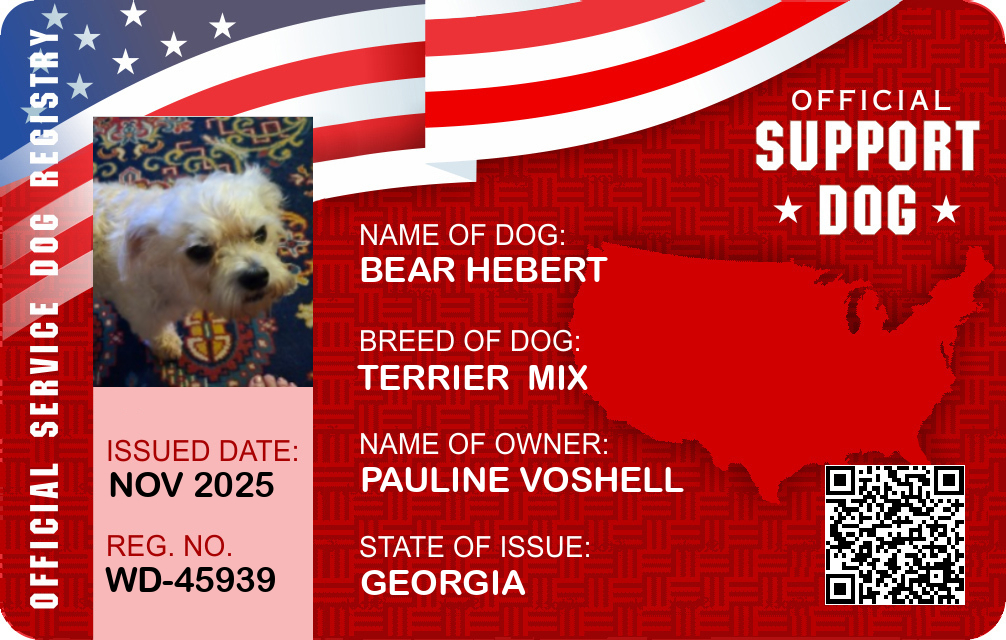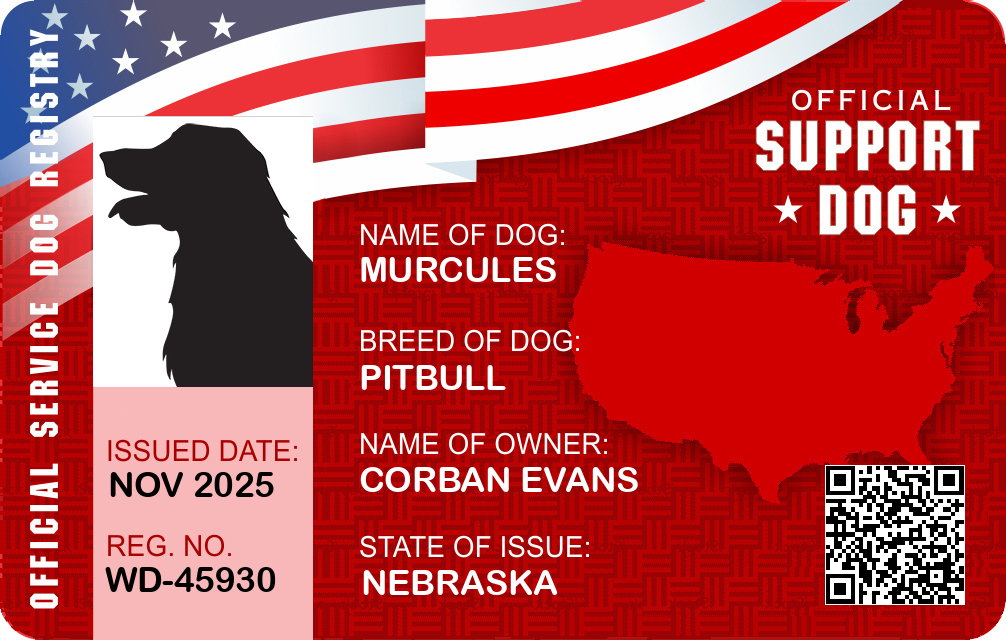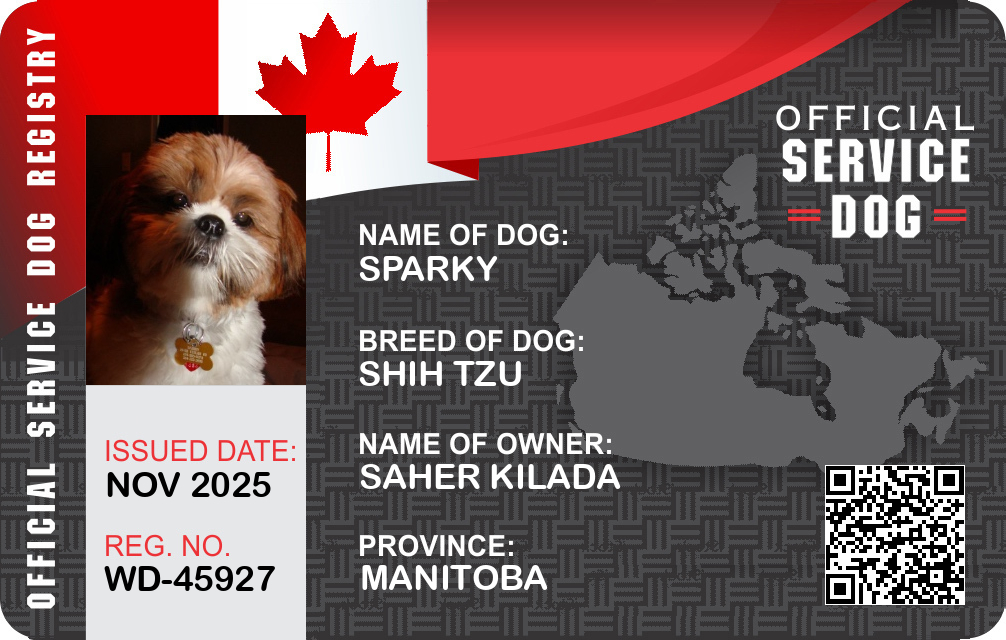Washington Service Dog Laws
Register Your Dog
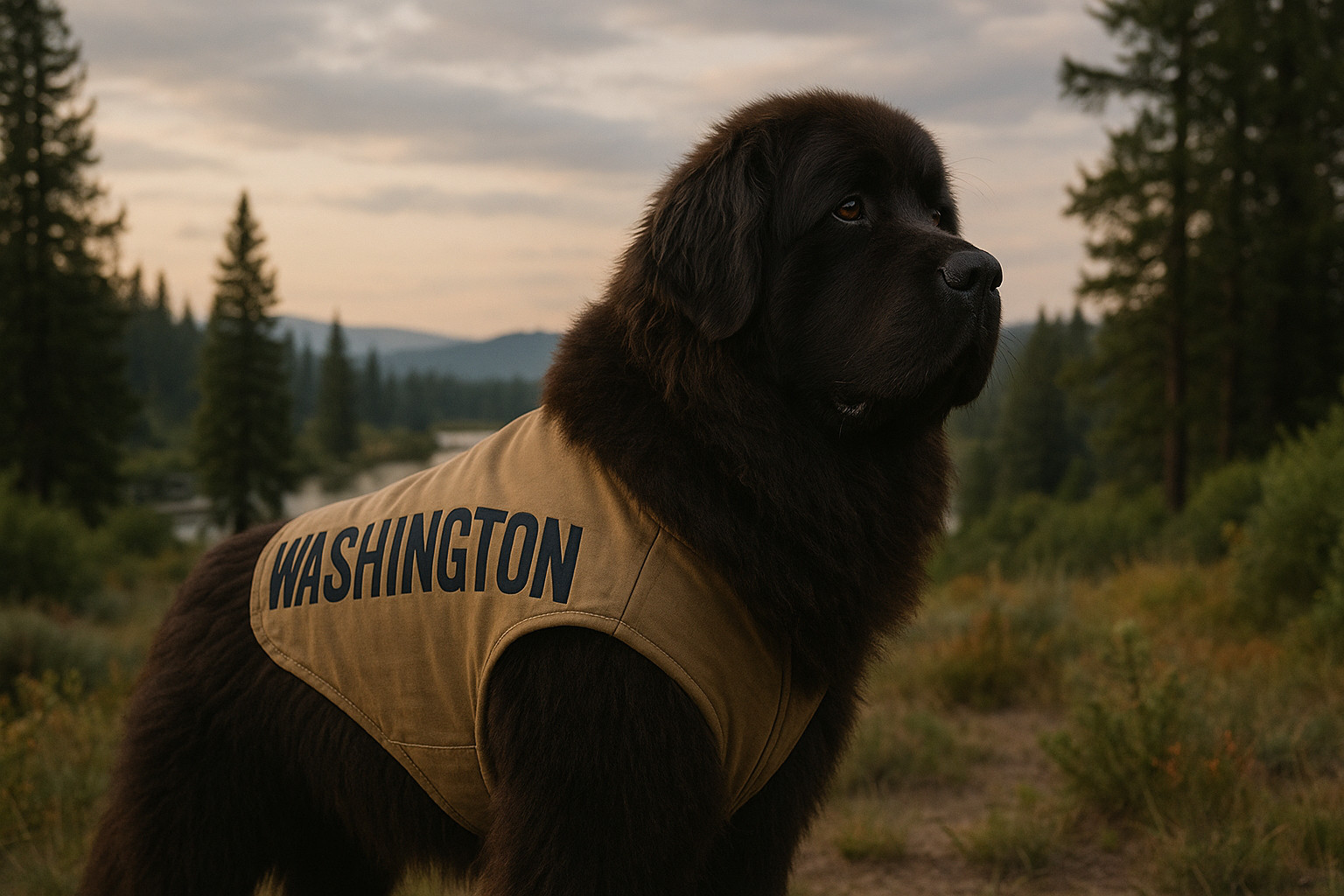
Overview of Service Dog and Legal Definitions in Washington
What is a Service Dog?
In the state of Washington, similar to other states in the U.S., a service dog is defined under federal law, primarily through the Americans with Disabilities Act (ADA). A service dog is a canine trained to perform specific tasks directly related to a handler’s disability. This definition ensures that service dogs are distinct from pets or emotional support animals by virtue of their training and function.
Service dogs can perform a wide array of tasks such as guiding individuals who are visually impaired, alerting individuals who are deaf to important sounds, pulling a wheelchair, alerting and protecting a person who is having a seizure, or reminding a person with mental illness to take prescribed medications. The specific training requirements tailored to the needs of individuals render these dogs crucial for the day-to-day activities and safety of their handlers.
How Service Dogs Differ from Other Types of Assistance Animals
Service dogs are often confused with other types of assistance animals, such as emotional support animals (ESAs) and therapy dogs. However, the distinction lies in their training and the legal protections afforded to them. Unlike service dogs, ESAs and therapy dogs are not trained to perform specific tasks related to a disability; instead, they provide comfort through their presence.
- Emotional Support Animals (ESAs): ESAs provide therapeutic benefit to individuals with a psychological disability purely through companionship. Unlike service dogs, they do not require specialized training to perform tasks.
- Therapy Dogs: These dogs visit hospitals, schools, and nursing homes to provide therapeutic benefits to various individuals, but they do not have the same legal rights as service dogs in terms of access.
The legal recognition of service dogs emphasizes their role as working animals as opposed to pets, granting them access rights to various public places.
Key Federal Laws Affecting Service Dogs (e.g., ADA, FHA, ACAA)
Federal laws play a pivotal role in defining and protecting the rights of service dog handlers, with key legislations being the Americans with Disabilities Act (ADA), the Fair Housing Act (FHA), and the Air Carrier Access Act (ACAA).
- ADA: This act ensures that individuals with disabilities have equal rights to access public places, including restaurants, hotels, and stores, with their service dogs. The ADA defines “service animals” specifically as dogs trained to do work or perform tasks for individuals with disabilities.
- FHA: Under the Fair Housing Act, individuals with disabilities are entitled to housing accommodations that permit service dogs, even in properties with no-pet policies.
- ACAA: This act outlines the rights of individuals traveling with service animals by air, ensuring that they are not discriminated against and can travel with their service dogs in the cabin.
State-Specific Service Dog Laws in Washington
Housing Rights and Responsibilities
In Washington, housing rights for service dog handlers are closely aligned with federal standards. Even if a property has a no-pet policy, the law requires landlords to accommodate tenants with service dogs. This accommodation is non-negotiable, provided the service dog assists with the tenant’s disability. While tenants cannot be charged pet fees, they may be held liable for any damage caused by the service dog.
To facilitate this accommodation, landlords may request a letter from a licensed professional such as a therapist or doctor, verifying the necessity of the service dog for the tenant’s disability. Washington law emphasizes the distinction between service dogs and ESAs or therapy animals, particularly in housing, meaning that service dogs are more broadly accepted under housing laws.
Public Access and Accommodation
In Washington, service dogs are granted comprehensive access to all public spaces, consistent with ADA guidelines. This includes access to restaurants, theaters, markets, and other businesses. Owners and operators of public facilities must permit access, and they are limited in what they can ask handlers; they may only inquire if the dog is required due to a disability and what task the dog is trained to perform.
Business operators cannot request documentation, nor can they ask handlers to prove their disability. However, they are within their rights to request the removal of a service dog if the animal is out of control and the handler does not take effective action to control it, or if the service dog is not housebroken.
Transportation and Travel Rules
The ACAA establishes that airlines must accommodate passengers with service animals for flights to and from Washington. Airlines are allowed to request documentation up to 48 hours before departure, particularly for flights longer than 8 hours. Airlines are required to make reasonable accommodations without imposing fees.
Service animal handlers should be prepared to provide a U.S. Department of Transportation Service Animal Air Transportation Form if requested. Furthermore, local transportation systems like buses and trains must accommodate service animals under Washington state laws and other federal regulations.
Employment and Workplace Considerations
Employers in Washington must comply with the ADA’s mandate to accommodate employees with service dogs, provided the accommodation does not cause undue hardship to the business. While employers can ask questions to ascertain the em
ployee’s need for a service dog, they cannot make unnecessary inquiries about the employee’s disability or demand excessive documentation.Workplaces must create an environment that is accessible and conducive for both the handler and the service dog. This may involve making adjustments to existing workspaces or routines to ensure effective accommodation. Employers should collaborate with their employees to identify how best to support their needs.
Documentation, Requirements, and Processes in Washington
Service Dog Documentation and Who Can Issue It
Unlike emotional support animals, service dogs do not require official identification or certification, but documentation may be helpful in specific instances like air travel or housing situations. Such documentation should be obtained from a licensed healthcare professional who can verify the handler’s disability and the necessity of a service dog.
Washington residents should be aware that although businesses cannot request proof of service dog status under ADA, having documentation can preemptively resolve potential conflicts, especially in housing and travel.
Landlord, Business, and Provider Verification Rules
Landlords in Washington, while required to accommodate service dogs, have the legal right to request reasonable documentation of an individual’s disability and the necessity of the animal. However, this request must be handled in accordance with privacy regulations that prevent unnecessary disclosure of personal medical details.
Businesses, under ADA and similar Washington statutes, are not permitted to request documentation for service animals entering public spaces, nor can they require registration or demand proof of training. However, their ability to deny entry based on behavior remains intact.
Rights, Limitations, and Legal Risks
Rights Service Dog Handlers Have in Washington
Individuals with service dogs in Washington have the right to be accompanied by their service animal in most public areas including dining establishments, museums, retail stores, and on public transportation. They are not required to pay additional fees for their dog’s presence in such areas and should expect to receive accommodations that permit their full participation in any public life activity.
Limits on Service Dog Protections and Common Restrictions
Though Washington offers comprehensive rights to service dog handlers, certain limitations exist. Service dogs can be excluded from particular medical and surgical areas in hospitals where their presence may compromise the sterile environment. Also, if a service dog is out of control, managers of establishments have the right to ask the handler to remove the animal until it can be effectively managed.
Penalties for Fraud or Misrepresentation
Misrepresentation of pets as service dogs is a legal offense in Washington. Fraudulently giving the impression that one’s pet is a service animal is counterproductive to genuine service animal efforts and comes with penalties, including fines. Washington is proactive in enforcing these laws and maintaining the credibility of legitimate service animal claims.
Practical Guidance for Service Dog Handlers in Washington
How to Qualify for a Service Dog Legitimately
For Washington residents seeking a service dog, consulting with a healthcare provider or a recognized service dog organization is paramount. A legitimate qualification involves not only possessing a recognized disability but also a specific need for a trained animal to assist with daily tasks.
How to Talk to Landlords, Airlines, and Employers
Communication with landlords regarding service dogs should emphasize the legal rights afforded under the FHA, importantly distinguishing service dogs from pets. With airlines, it is essential to preempt any issues by supplying all requested documentation within the required time frames, and ensuring awareness of the ACAA regulations that protect them. Employers should be approached with an understanding of ADA guidelines, focusing discussions on accommodations and how the service dog enhances workplace efficiency and safety.
Summary of Service Dog Laws in Washington
Washington state’s service dog laws are comprehensive, supporting individuals with disabilities with ample rights and legal protections. Handlers must remain informed of both federal and state laws to navigate public and private spaces successfully. Here’s a quick recap of the main points outlined:
**
- Service dogs are defined under strict criteria, fulfilling trained tasks for specific disabilities.
- Federal laws (ADA, FHA, ACAA) grant broad access rights that intersect with Washington’s state-specific measures.
- Service dog handlers can expect equal treatment in housing, public venues, transportation, and workplaces without discriminatory practices.
- Legal documentation requirements vary by context but remain crucial for conflict prevention.
- Exclusions exist predominantly in cases of safety and health where service dog presence is not feasible.
- Misrepresentation is penalizable, underscoring the importance of genuine representation and adherence to legal standards.
- Handlers should foster open dialogues with relevant parties to advocate for their rights and ensure smooth integration of service dogs in daily life.
**
Understanding these facets contributes significantly to enhancing the quality of life for those who rely on service dogs in Washington, ensuring their rights are recognized and upheld in all public and private sectors.



